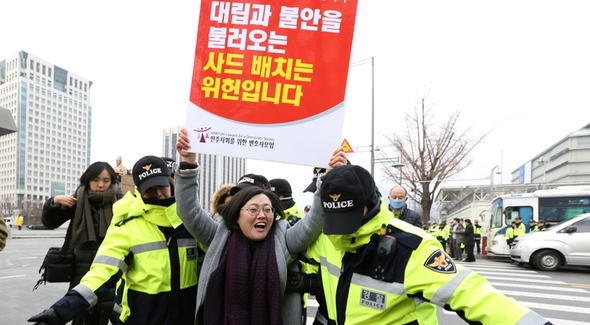 |
|
Ha Ju-hui, a lawyer with MINBYUN-Lawyers for a Democratic Society, is led across the street from the US embassy by police during her one-person demonstration on Feb. 16. 2016. Her sign reads, “The THAAD system which brings conflict and trouble is unconstitutional.”
|
Police had moved a lawyer who was protesting the THAAD deployment away from the US embassy
On Nov. 29, South Korea’s National Human Rights Commission ruled that the police had “infringed upon the freedom of expression” by preventing one-person demonstrations from being held in front of the entrance to the US Embassy in Seoul. Ha Ju-hui, a lawyer with MINBYUN-Lawyers for a Democratic Society, was holding a placard that read “The THAAD deployment is unconstitutional” during a one-person demonstration in front of the US Embassy, in Seoul’s Jongno District, on Feb. 16, 2016, when she was stopped by the police. The police forced Ha to continue her one-person demonstration 15 meters away from the embassy. So Ha filed a complaint with the National Human Rights Commission, arguing that this was an infringement of her freedom of expression. Seoul Jongno Police Station explained to the NHRCK that it is “in violation of the Vienna Convention [on Diplomatic Relations] to hold demonstrations that pose a risk of insulting diplomatic emissaries directly in front of a diplomatic office.” “While the demonstration could have been restricted outright due to concerns of provoking other anti-US groups, we allowed [Ha] to continue from a distance of 15 meters outside the embassy to maximally guarantee freedom of expression,” it added. Due to the presence of around five other attorneys near Ha and the taking of pictures, the station concluded that the gathering was an “illegal rally under the guise of a one-person demonstration.” The NHRCK argued that the demonstration “cannot be viewed as an illegal rally simply because other members of the same groups took photographs of the one-person demonstration, nor was it explicit enough a violation of public safety and order to warrant the immediate invocation of police authority to stop it.” “This was a violation of the freedom of expression to hold a demonstration in the symbolic setting represented by the US Embassy’s main entrance,” the commission said. Article 2 of the Assembly and Demonstration Act defines demonstrations as acts by “a group of persons,” which is understood to mean that police do not have the authority to permit or ban one-person demonstrations as such. The NHRCK recommended that the Jongno Police Station chief “establish measures to maximally guarantee one-person demonstrations on the sidewalks in front of embassies.” By Heo Jae-hyun, staff reporter Please direct questions or comments to [english@hani.co.kr]






